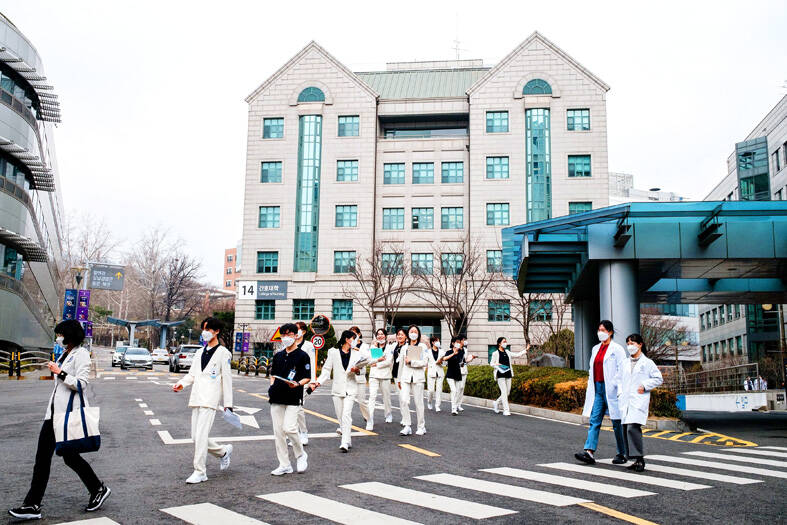South Korea has suspended the medical licences of two doctors, the Korean Medical Association said yesterday, in the first punitive action over a month-long strike that has caused healthcare chaos.
Thousands of junior doctors stopped working on Feb. 20 to protest government reforms aimed at creating more medics to end shortages and deal with a rapidly aging population, forcing hospitals to cancel crucial treatments and surgeries, including chemotherapy and C-sections.
The government has repeatedly urged doctors to return to their patients, warning of legal action for non-compliance, but the standoff has spiraled, with senior doctors now threatening to join their junior colleagues and no serious talks under way.

Photo: AFP
Two officials from the Korean Medical Association, which has been heavily involved in the walkout, were informed on Monday that their licenses had been suspended for three months, purportedly for instigating the strike.
“The two officials, Kim Taek-woo and Park Myung-ha, received the notice yesterday,” spokesperson Lee Seok-young said.
A South Korean Ministry of Health and Welfare spokesperson said that the government would not provide confirmation regarding the specific administrative actions taken against individual physicians.
The association has previously accused the government of using “intimidation tactics” to try to force doctors back to work, and said it was turning the country into a “totalitarian state.”
Under South Korean law, doctors are restricted from striking, and the government has requested police investigate people connected to the stoppage, including officials at the association.
“The government deeply regrets the current situation where even professors are considering resigning following the footsteps of trainees,” South Korean Second Vice Health Minister Park Min-soo told reporters yesterday.
“Once again, the government is willing to talk to the medical community at any time without conditions,” he said, although Seoul has emphasized that abandoning the reform plan is not an option.
Seoul is pushing to admit 2,000 more students to medical schools annually from next year to address what it says is one of the lowest doctor-to-population ratios among developed nations.
Doctors say they fear the reform would erode the quality of service and medical education, but proponents of the plan accuse them of trying to safeguard their salaries and social status.
South Korean President Yoon Suk-yeol yesterday said the reforms were necessary, and lamented the fierce opposition from physicians.
“Medical licenses granted to save the lives of the people should not be used as a means of threatening and destabilizing the people,” Yoon said.
The reforms will “strengthen essential medical care in the [non-capital] regions,” he added.
Experts say that one of the South Korean medical system’s biggest problems is that many doctors are concentrated in the Seoul metropolitan area leading to access issues in rural areas.
Last week, the junior doctors said they had submitted a “letter requesting emergency intervention” from the International Labour Organization (ILO), claiming they were being “forced” by the government into unwanted labour. The government has dismissed the claim.
The reform plan enjoys broad public support, but a new poll by local media found 34 percent of people wanted the government to negotiate to end the standoff.

Kehinde Sanni spends his days smoothing out dents and repainting scratched bumpers in a modest autobody shop in Lagos. He has never left Nigeria, yet he speaks glowingly of Burkina Faso military leader Ibrahim Traore. “Nigeria needs someone like Ibrahim Traore of Burkina Faso. He is doing well for his country,” Sanni said. His admiration is shaped by a steady stream of viral videos, memes and social media posts — many misleading or outright false — portraying Traore as a fearless reformer who defied Western powers and reclaimed his country’s dignity. The Burkinabe strongman swept into power following a coup in September 2022

‘FRAGMENTING’: British politics have for a long time been dominated by the Labor Party and the Tories, but polls suggest that Reform now poses a significant challenge Hard-right upstarts Reform UK snatched a parliamentary seat from British Prime Minister Keir Starmer’s Labor Party yesterday in local elections that dealt a blow to the UK’s two establishment parties. Reform, led by anti-immigrant firebrand Nigel Farage, won the by-election in Runcorn and Helsby in northwest England by just six votes, as it picked up gains in other localities, including one mayoralty. The group’s strong showing continues momentum it built up at last year’s general election and appears to confirm a trend that the UK is entering an era of multi-party politics. “For the movement, for the party it’s a very, very big

ENTERTAINMENT: Rio officials have a history of organizing massive concerts on Copacabana Beach, with Madonna’s show drawing about 1.6 million fans last year Lady Gaga on Saturday night gave a free concert in front of 2 million fans who poured onto Copacabana Beach in Rio de Janeiro for the biggest show of her career. “Tonight, we’re making history... Thank you for making history with me,” Lady Gaga told a screaming crowd. The Mother Monster, as she is known, started the show at about 10:10pm local time with her 2011 song Bloody Mary. Cries of joy rose from the tightly packed fans who sang and danced shoulder-to-shoulder on the vast stretch of sand. Concert organizers said 2.1 million people attended the show. Lady Gaga

SUPPORT: The Australian prime minister promised to back Kyiv against Russia’s invasion, saying: ‘That’s my government’s position. It was yesterday. It still is’ Left-leaning Australian Prime Minister Anthony Albanese yesterday basked in his landslide election win, promising a “disciplined, orderly” government to confront cost-of-living pain and tariff turmoil. People clapped as the 62-year-old and his fiancee, Jodie Haydon, who visited his old inner Sydney haunt, Cafe Italia, surrounded by a crowd of jostling photographers and journalists. Albanese’s Labor Party is on course to win at least 83 seats in the 150-member parliament, partial results showed. Opposition leader Peter Dutton’s conservative Liberal-National coalition had just 38 seats, and other parties 12. Another 17 seats were still in doubt. “We will be a disciplined, orderly